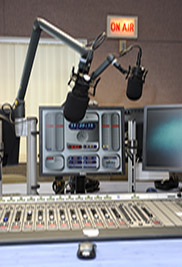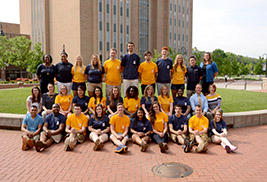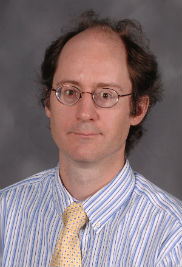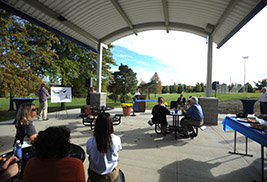eInside Briefs
News Briefs
- WKSU Wins Seven Awards From Ohio Associated Press Media Editors
- It’s that Time Again! Destination Kent State Advising and Registration is Right Around the Corner
- Kent State English Professor Edits Correspondence Written by Walt Whitman’s Mother
- University Libraries Awards Inaugural Student Assistant Scholarship to Sophomore Student
- Student Recreation Fields Open to the Kent State Community
WKSU Wins Seven Awards From Ohio Associated Press Media Editors

WKSU was honored with seven awards
from the Ohio Associated Press Media
Editors Association. The station won a
second-place award for Best News
Operation.
In a ceremony held May 18 in Columbus, Ohio, WKSU was honored with seven awards from the Ohio Associated Press Media Editors Association, including a second-place award for Best News Operation. The event celebrated the best journalism in Ohio. It is the second year that contests for print and broadcast reporting were combined.
Amanda Rabinowitz was recognized with a first-place award for her work as local anchor for NPR’s “Morning Edition.” Rabinowitz has been a reporter, host and producer at WKSU since 2007. She is a member of the adjunct faculty at the University of Akron, teaching undergraduate classes in journalism and broadcasting.
A first-place award went to reporters M.L. Schultze and Tim Rudell for their continuing coverage of hydraulic fracturing – or “fracking.” The controversial practice injects fluid into shale deposits in order to extract natural gas. Schultze and Rudell covered the topic from many angles (access to natural resources, job development, economic growth, water and air quality), without taking sides, to give listeners the best information on a difficult subject. Schultze also received a second-place award for Best Breaking News.
Reporter Jeff St. Clair took home a first-place award for Best Enterprise Reporting for his ongoing “Exploradio” series. Innovation and creativity happen everywhere, but in Northeast Ohio there has been an atmosphere of almost urgent reinvention. St. Clair’s focus on scientific breakthrough and innovative thinking produced regionally offered listeners thought-provoking profiles of important projects that were often in their early stages. A story from the series on experiments surrounding the strength of trees earned St. Clair a second-place award for Best Sound.
WKSU was the first-place winner for Best Use of Multimedia. Under the direction of Chuck Poulton, the award was based on the quality of the station’s website and social media efforts. The judges said, “Easy to use site. Fairly newsy. Easy to find audio and programs. Facebook page was interesting and interactive with good pictures. Enjoyed the Quick Bites page.”
WKSU is an award-winning public radio station and service of Kent State University that broadcasts to 22 counties throughout Northeast Ohio from the station’s primary signal at 89.7. WKSU content also can be heard over WKRW 89.3 (Wooster), WKRJ 91.5 (Dover/New Philadelphia), WKSV 89.1 (Thompson), WNRK 90.7 (Norwalk) and W239AZ 95.7 (Ashland). The station adds WKSU-2 Folk Alley, WKSU-3 The Classical Channel and WKSU-4 The News Channel over HD Radio and as streaming audio at www.wksu.org.
back to top
It’s that Time Again! Destination Kent State Advising and Registration is Right Around the Corner

Flashguides, a group of diverse and fun-loving students,
serve as mentors to new students during the Destination
Kent State advising and registration program. Twenty-four
students make up this year's Flashguides class.
The June and July advising and registration program is a one-and-a-half-day experience that includes an overnight stay in a residence hall. Students are encouraged to invite family members to participate in the program. The students explore important topics, including the differences between high school and college, navigating the university, and properly preparing to be a college student. Family members learn about essential tools for a positive college experience, such as financial aid, academic success tips and support skills for being the parent or family member of a college student.
The program concludes on the second day when students meet one-on-one with an academic advisor and create an academic plan.
This year, advising and registration sessions will be held between June 2 and July 16 with a break the week of July 4.
The advising and registration program helps students make the all-important first connection to the university. One way students make connections is through their relationship with an exceptional group of students called Flashguides. They are part mentor, part ally, part cheerleader and part program organizer. This year’s class of 24 Flashguides is a diverse and fun-loving group of students who participate in the program because they want to make a difference in the lives of new students.
Join the Office of Student Success Programs in welcoming the Flashguides class of 2014 to their positions. We all have a stake in their success.
Alyssa Mazey (Senior, Public Communication)
Clayton Snyder (Junior, Psychology)
Emma Puz (Sophomore, Finance)
Ian Klein (Junior, Broadcast Journalism)
Kevin Muskiewicz (Junior, Finance)
Lauren Belack (Sophomore, Human Development & Family Studies)
Joshua Jenkins (Junior, Finance & Economics)
Maxwell Jabara (Sophomore, Theatre Studies -Design/Tech)
Meghan Fitzgerald (Junior, Speech Pathology)
Nyaruach Chuol (Junior, Sociology & Psychology)
Taylor Hurley (Sophomore, Public Communication)
Taylor Winter (Senior, Health Communication)
Brandon Gonos (Sophomore, Computer & Management Information Systems)
Champaigne Powell (Sophomore, Fashion Merchandising)
Cheyenne Fletcher (Sophomore, Exploratory)
Corey Patterson (Sophomore, Applied Communication)
Delana Noil (Sophomore, Interior Design)
Jordyn Kovolyan (Senior, Educational Studies)
Kaitlin Boyle (Junior, Applied Communication)
Kimberleigh Anderson (Junior, Broadcast Journalism)
Megan Greives (Sophomore, Marketing)
Nathan LaChance (Sophomore, Applied Communication)
Reginald Jones (Sophomore, Interpersonal Communication)
Samantha Kropp (Sophomore, Early Childhood Education)
back to top
Kent State English Professor Edits Correspondence Written by Walt Whitman’s Mother

Wesley Raabe, Ph.D., assistant
professor in the Department of English
at Kent State University, has edited
Louisa Van Velsor Whitman’s extant
letters to her son.
Celebrated American poet Walt Whitman described his mother as “illiterate in the formal sense,” but claimed that she had an extraordinary influence on his most well-known book of poems Leaves of Grass. He once suggested that his great work was the “flower of her temperament active in me.”
Louisa Van Velsor Whitman’s extant letters to her son span some of the most difficult years both of his life and a traumatic period in American history during the Civil War and early Reconstruction era. Though mostly known to scholars, this correspondence has been previously published only in short excerpts.
Wesley Raabe, Ph.D., assistant professor in the Department of English at Kent State University, has edited her 170 letters and published them with the title “walter dear”: The Letters from Louisa Van Velsor Whitman to Her Son Walt on the Walt Whitman Archive at www.whitmanarchive.org. Raabe’s introduction to the edition places the letters in the context of her life. Scholars and the public will be able to read Walt Whitman’s letters alongside the replies of his mother, by far his most frequent correspondent.
The newly published letters feature digital facsimiles, authoritative transcriptions, annotation and integration with Walt Whitman’s and other family members’ letters in the Whitman Archive section titled “Correspondence.” The letters, most sent from Louisa Whitman in Brooklyn, New York, to Walt Whitman in the nation’s capital, span the period from just before the outbreak of the Civil War through a week before her death in May 1873, and they helped keep the Whitman family connected both during and after the war. Walt Whitman served as a clerk at the U.S. Attorney General's office and as a volunteer nurse to wounded soldiers. He continued to live in Washington after the war, when his public reputation began to rise.
Her letters provide an unusually rich record for the daily life of a working-class widow in Brooklyn. Though Louisa Whitman had no formal education and her letters lacked formal correctness, she wrote with considerable power and expressiveness and sometimes offered insight into the “family usages” that shaped Walt Whitman's poetry.
“What surprised me most was the range of her reading in periodicals forwarded by Walt and a wicked sense of humor,” Raabe says. “A letter from her son-in-law, painter Charles Heyde, was dismissed as ‘three sheets of foolscap paper and a fool wrote on them.’”
The Whitman Archive, established in 1995, is an electronic research and teaching tool that sets out to make Walt Whitman’s vast work conveniently accessible to scholars, students and general readers. It is co-directed by Kenneth Price, Ph.D., the Hillegass University Professor of American Literature and co-director of University of Nebraska-Lincoln’s Center for Digital Research in the Humanities, and Ed Folsom, Ph.D., the Carver Professor of English at the University of Iowa.
Raabe is the editor of the National Era text of Uncle Tom’s Cabin for Uncle Tom’s Cabin & American Culture and is at work on Uncle Tom’s Cabin: A Digital Critical Edition. His research interests are the broader disciplines of bibliography, textual criticism and digital humanities. He teaches American literature (through the early 20th century), scholarly editing, research methods, African-American literature, sentimentalism (American and transatlantic), modernism and regional writing.
For more information about Kent State’s Department of English, visit www.kent.edu/english.
back to top
University Libraries Awards Inaugural Student Assistant Scholarship to Sophomore Student

James Bracken, dean of Kent State
Universities Libraries, stands with Kent
State sophomore Carissa Deeds, the
first recipient of the Kent State University
Libraries Student Assistant Scholarship.
What began as a job to help pay for college and meet new people turned into a bigger reward than Kent State University sophomore Carissa Deeds could have imagined.
Deeds was recently awarded the first annual Kent State University Libraries Student Assistant Scholarship.
The scholarship was created for students who are in good standing with the university, demonstrate financial need and hold a GPA of 3.0 or higher. Scholarship preference was given to student library assistants. Deeds has been employed by the University Libraries’ serials department since 2012.
Deeds can apply the $1,000 scholarship to books, tuition or fees in the 2014-15 school year. With the cost of higher education, Deeds says every bit of help makes a difference.
“This is going to be a huge help financially,” she says. “Because I am working on both a major in early education and a minor in sign language in four years, I am taking way over the credit limit. It’s a lot moneywise. This scholarship will help me continue to pay for college and graduate on time.”
In the essay that secured her scholarship, Deeds wrote about how working at the library helped her meet new people and made the transition from high school to college smoother.
“This job helps me to pay for my education, but it has also made it easier to meet new friends,” Deeds says. “I love it here and I’m so excited to win the scholarship. This is a big honor for me, and I’m very humbled by it.”
Originally from Massillon, Deeds is the daughter of Dee and Roger Deeds, also from Massillon.
The Kent State University Libraries Student Assistant Scholarship is an endowed scholarship created by University Libraries. The endowment was funded by donations from the Friends of University Libraries. The initial endowment of $25,000 allows University Libraries to award one, $1,000 scholarship per year.
For more information about supporting the Kent State University Libraries Student Assistant Scholarship, contact Karen Hillman at 330-672-1886.
back to top
Student Recreation Fields Open to the Kent State Community

Kent State University community members make use of the
pavilion at the Student Recreation Fields.
Kent State University faculty, staff and students are encouraged to take advantage of the Student Recreation Fields this summer.
The Student Recreation Fields officially opened in October 2013 and are used by a number of Kent State club sports teams for practices and games, says Abby Millsaps, marketing coordinator for Kent State’s Department of Recreational Services.
The space is also intended for outdoor intramural sports, such as flag football, and for pickup games. The opportunities are close to “limitless,” Millsaps says.
The fields are located off Loop Road. The first field is across the street from the Student Recreation and Wellness Center, and the second is across from the Ice Arena.
The fields have already proved a success, as many students were quick to use the space to their liking in the fall. This was most evident during the flag football season.
“It was the first time in 14 years that we were able to bring outdoor soccer back to Kent State,” says Millsaps. “It was very fun. We had tons of participation.”
There also is a brand-new covered pavilion between the fields with restroom facilities and picnic tables.
“It’s a really nice spot,” says Millsaps. “You can have your lunch or hang out there between classes.”
Effective identifiers for the fields are two large flag poles that indicate the availability of the space. This “flag notification system” uses three different colors to convey the following to the Kent State community:
- Red flag - closed due to unsatisfactory weather or safety conditions
- Yellow flag - official recreational services program or reservation on the field
- Green flag - open to the general public on a first-come, first-served basis
Soon a television in the pavilion will indicate which club or intramural team is using the field at what time.
Reservations can be made through the Department of Recreational Services.
“We invested a lot into making these really nice fields for the students, faculty and staff,” says Millsaps. “We constructed the fields. We evened out the land; we brought in experts to make sure we got really good grass on the fields. That’s why we care so much about them.”
The two fields were fertilized and aerated, so they are in top condition for the upcoming season. Whether people are kicking a soccer ball into the nets or throwing a Frisbee disc around, the land is a valuable asset to the Kent State community.
“The Student Recreation Fields will be available all summer,” says Millsaps. “This a great time for students to enjoy what our campus and recreational services has to offer.”
For more information about the Student Recreation Fields, contact Millsaps at 330-672-0465 or amillsap@kent.edu.
back to top